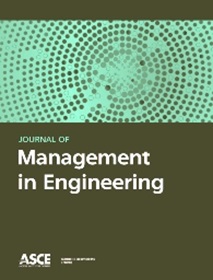求助PDF
{"title":"意外事件的成功变革管理策略:新冠肺炎对设施管理的影响","authors":"Dipin Kasana, Jake B. Smithwick, J. Dodd, Tara L. Cavalline, G. Mayo","doi":"10.1061/jmenea.meeng-4870","DOIUrl":null,"url":null,"abstract":"Facility managers are increasingly tasked with being the champions of change in their organizations, which may include activities such as space management revisions, construction delivery practices, maintenance programs, technology implementations, and others. While much of the previous organization change management research has focused on how facility managers enable the adoption of planned change events (i.e., new technology), this study identifies the successful change strategies used in responding to unforeseen circumstances or events. The researchers evaluated these unplanned changes through the lens of COVID-19, given its nearly universal impact on facility management as a profession. The research team collected survey data from nearly 900 organizations in more than 60 countries, and conducted detailed follow-up interviews with 28 organizations. Twenty-two parameters were grouped into three categories: organizational characteristics, organizational change management practices, and change adoption measures. The research team used three random forest models and three logistic regression models to further examine the relationship between the data and the change adoption measures. The results indicate that three organizational change practices were particularly important to overall adoption success and achievement: appointment of a change agent, support of leaders, and the timeframe for implementing the change. The analysis also suggests that the type of unplanned change initiative has an impact on its long-term adoption throughout the organization. Organizations should consider using a formal change management approach in order to successfully implement unplanned change initiatives. This paper highlights the importance of an effective change, the active involvement and support of senior leaders, and the timeline of implementing the change - even if it is unforeseen. © 2023 American Society of Civil Engineers.","PeriodicalId":50155,"journal":{"name":"Journal of Management in Engineering","volume":" ","pages":""},"PeriodicalIF":5.3000,"publicationDate":"2023-07-01","publicationTypes":"Journal Article","fieldsOfStudy":null,"isOpenAccess":false,"openAccessPdf":"","citationCount":"2","resultStr":"{\"title\":\"Successful Change Management Strategies for Unforeseen Events: Impact of COVID-19 on Facility Management\",\"authors\":\"Dipin Kasana, Jake B. Smithwick, J. Dodd, Tara L. Cavalline, G. Mayo\",\"doi\":\"10.1061/jmenea.meeng-4870\",\"DOIUrl\":null,\"url\":null,\"abstract\":\"Facility managers are increasingly tasked with being the champions of change in their organizations, which may include activities such as space management revisions, construction delivery practices, maintenance programs, technology implementations, and others. While much of the previous organization change management research has focused on how facility managers enable the adoption of planned change events (i.e., new technology), this study identifies the successful change strategies used in responding to unforeseen circumstances or events. The researchers evaluated these unplanned changes through the lens of COVID-19, given its nearly universal impact on facility management as a profession. The research team collected survey data from nearly 900 organizations in more than 60 countries, and conducted detailed follow-up interviews with 28 organizations. Twenty-two parameters were grouped into three categories: organizational characteristics, organizational change management practices, and change adoption measures. The research team used three random forest models and three logistic regression models to further examine the relationship between the data and the change adoption measures. The results indicate that three organizational change practices were particularly important to overall adoption success and achievement: appointment of a change agent, support of leaders, and the timeframe for implementing the change. The analysis also suggests that the type of unplanned change initiative has an impact on its long-term adoption throughout the organization. Organizations should consider using a formal change management approach in order to successfully implement unplanned change initiatives. This paper highlights the importance of an effective change, the active involvement and support of senior leaders, and the timeline of implementing the change - even if it is unforeseen. © 2023 American Society of Civil Engineers.\",\"PeriodicalId\":50155,\"journal\":{\"name\":\"Journal of Management in Engineering\",\"volume\":\" \",\"pages\":\"\"},\"PeriodicalIF\":5.3000,\"publicationDate\":\"2023-07-01\",\"publicationTypes\":\"Journal Article\",\"fieldsOfStudy\":null,\"isOpenAccess\":false,\"openAccessPdf\":\"\",\"citationCount\":\"2\",\"resultStr\":null,\"platform\":\"Semanticscholar\",\"paperid\":null,\"PeriodicalName\":\"Journal of Management in Engineering\",\"FirstCategoryId\":\"5\",\"ListUrlMain\":\"https://doi.org/10.1061/jmenea.meeng-4870\",\"RegionNum\":1,\"RegionCategory\":\"工程技术\",\"ArticlePicture\":[],\"TitleCN\":null,\"AbstractTextCN\":null,\"PMCID\":null,\"EPubDate\":\"\",\"PubModel\":\"\",\"JCR\":\"Q1\",\"JCRName\":\"ENGINEERING, CIVIL\",\"Score\":null,\"Total\":0}","platform":"Semanticscholar","paperid":null,"PeriodicalName":"Journal of Management in Engineering","FirstCategoryId":"5","ListUrlMain":"https://doi.org/10.1061/jmenea.meeng-4870","RegionNum":1,"RegionCategory":"工程技术","ArticlePicture":[],"TitleCN":null,"AbstractTextCN":null,"PMCID":null,"EPubDate":"","PubModel":"","JCR":"Q1","JCRName":"ENGINEERING, CIVIL","Score":null,"Total":0}
引用次数: 2
引用
批量引用
Successful Change Management Strategies for Unforeseen Events: Impact of COVID-19 on Facility Management
Facility managers are increasingly tasked with being the champions of change in their organizations, which may include activities such as space management revisions, construction delivery practices, maintenance programs, technology implementations, and others. While much of the previous organization change management research has focused on how facility managers enable the adoption of planned change events (i.e., new technology), this study identifies the successful change strategies used in responding to unforeseen circumstances or events. The researchers evaluated these unplanned changes through the lens of COVID-19, given its nearly universal impact on facility management as a profession. The research team collected survey data from nearly 900 organizations in more than 60 countries, and conducted detailed follow-up interviews with 28 organizations. Twenty-two parameters were grouped into three categories: organizational characteristics, organizational change management practices, and change adoption measures. The research team used three random forest models and three logistic regression models to further examine the relationship between the data and the change adoption measures. The results indicate that three organizational change practices were particularly important to overall adoption success and achievement: appointment of a change agent, support of leaders, and the timeframe for implementing the change. The analysis also suggests that the type of unplanned change initiative has an impact on its long-term adoption throughout the organization. Organizations should consider using a formal change management approach in order to successfully implement unplanned change initiatives. This paper highlights the importance of an effective change, the active involvement and support of senior leaders, and the timeline of implementing the change - even if it is unforeseen. © 2023 American Society of Civil Engineers.


